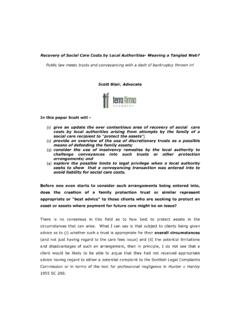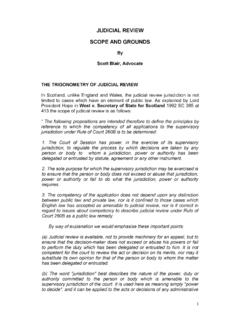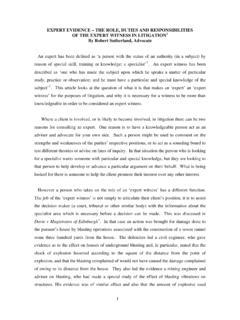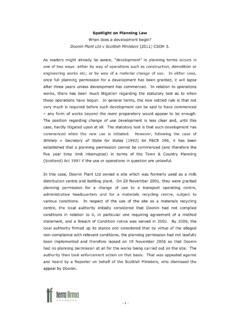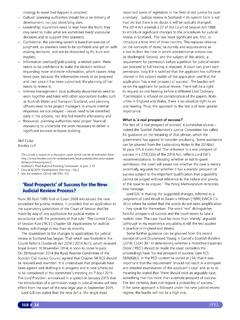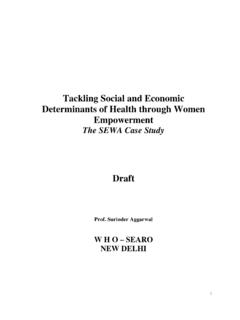Transcription of CARE HOME FEES AVOIDANCE AND ANTI …
1 1 care HOME FEES AVOIDANCE AND ANTI- AVOIDANCE ISSUES SCOTT BLAIR, advocate GENERAL LEGISLATIVE FRAMEWORK-SCOPE OF DUTY OF COUNCIL 1. The framework of our social work legislation imposes a duty on a local authority to provide care services including residential accommodation for persons with particular needs or vulnerabilities, including the elderly-see generally sections 12(1), (2) Social Work (Scotland) Act 1968. This broadly mirrors section 21 of the National Assistance Act 1948 which makes provision for England and Wales. The 1968 Act repealed section 21 as regards Scotland. English cases still remain relevant. I can only attempt a summary of the legislation and do not have time to cover all of it.
2 I will aim to deal with the main provisions which relate to AVOIDANCE issues. 2. Sections 12 (3A) and 12(3B) to (3C) of that Act makes further provision. Section 12(3A) provides that a local authority considering paying for residential accommodation itself or by securing provision by others, shall disregard so much of the persons resources as are prescribed or as determined by them in a prescribed manner. 3. The further provision deals with the content of what may be prescribed by regulations. Sections 12(3A) and 3B were inserted by the Community care (Residential Accommodation) Act 1998 to provide greater certainty as to the duties of the local authority to assist people with savings below limits for residential care .
3 This was a reaction to the decision on R v Sefton MBC , ex parte Help the Aged [1997] 4 All ER 532 where a council had decided that people with savings of over 1500 would be expected to make their own arrangements for residential care even although the then regulations said that the first 10,000 in savings had to be disregarded. The council was found to have acted unlawfully. 4. In Scotland it had been held that a decision by a local authority whether or not to provide residential care services itself under section 13A of the 1968 Act can properly have regard to such capital as did not exceed the capital limit-see Robertson v Fife Council 2000 SLT 1226 . This could have included notional capital which the resident had deprived themselves of and which they could not access.
4 However this approach was held to be erroneous by the House of Lords. 2 5. In Robertson v Fife Council [2002] UKHL 35; 2002 SC (HL) 145; 2002 SLT 951; 2003 SCLR 39, in summary it was held that the Fife Council erred when it refused to make arrangements for provision to appellant of residential accommodation with nursing on grounds that her capital exceeded limit under National Assistance (Assessment of Resources) Regulations 1992 - Notional capital could be taken into account when charges were being made for services but not at earlier stage when decision was being taken to provide services - Social Work (Scotland) Act 1968 sections 12(1), (3A), 12A(1), 13A(1). 6. The background to that appeal was that the elderly lady in question appealed against a decision of the Inner House refusing her reclaiming motion against the dismissal of her petition for judicial review of F's refusal to enter into arrangements to provide her with residential nursing care .
5 By reason of her suffering from senile dementia R would require nursing care in secure surroundings for the rest of her life. F's refusal to fund the provision of such care was based upon their conclusion that she had transferred ownership in her house to her children for the purpose of reducing her future liability to contribute towards the costs of residential care . In assessing her means the local authority had taken into account a notional capital figure equivalent to the value of the house. As a consequence of the local authority's decision R may have had to move out of the accommodation which best met her care needs into less appropriate accommodation. F relied upon the Social Work (Scotland) Act 1968 section 12(3A) and section 12(3B) as providing statutory authority for its decision in respect of the provision of residential accommodation, and further submitted that section 12A (1) (b) as read in conjunction with section 13A (1) permitted an authority to take into account financial resources when deciding whether to provide residential accommodation with nursing under section 13A.
6 7. The House held, allowing the appeal, that F had erred in taking R's capital, including her notional capital, into account when assessing her need for residential accommodation with nursing; (1) the duty to provide residential accommodation with nursing under section 13A was separate and distinct from the duty under section 12 to provide general social and welfare services, including the provision of residential accommodation. This meant that, giving the words "for the purposes of this section" in section 12(3A) their ordinary meaning, a local authority needed to perform the exercise directed in that subsection as to a person s capital when making a determination regarding the provision of residential accommodation under section 12, but not when making a decision as to the provision of residential accommodation with nursing under section 13A; (2) the direction to disregard capital under the limit in section 12(3A) could not be interpreted as indicating that capital above the limit was to be brought into account in determining the need for the provision of accommodation.
7 Such capital was taken into account when charges were made for the accommodation provided, and (3) the words in 3 section 12A (1) (b) which required a local authority to decide whether the needs of a person "call for" the provision of services, were directed to the person's needs for any of the services which the local authority were able to provide, not to the question whether the person was able to pay for them. 8. The duty to provide nursing care is enforceable-see MacGregor v South Lanarkshire Council 2001 502; 2001 233, the petitioner was assessed as needing 24 hour care but put on a waiting list until funding was available. This was unlawful. Once a need for a particular service is established, it must be provided, if the needs cannot be met in any other way, even in the short to medium term.
8 The Council were bound to find a nursing home place. GENERAL LEGISLATIVE FRAMEWORK- AVOIDANCE AND RECOVERY 9. Where a person is provided with accommodation the cost of that can be recovered in accordance with section 22(2) to 22(8) of the National Assistance Act 1948. Unlike non-residential care a local authority has no discretion not to charge (for non-residential care see section 87 of the 1968 Act). In the exercise of discretion the charging rules can start to bite once the person has been in care for eight weeks. Sections 22(2) to 22(8) are imported into the 1968 Act by section 87 of the 1968 Act. 10. Section 22 provides: 22. Charges to be made for accommodation. (2) Subject to the following provisions of this section, the payment which a person is liable to make for any such accommodation shall be in accordance with a standard rate fixed for that accommodation by the authority managing the premises in which it is provided and that standard rate shall represent the full cost to the authority of providing that accommodation.
9 (3) Where a person for whom accommodation in premises managed by any local authority is provided, or proposed to be provided, under this Part of this Act satisfies the local authority that he is unable to pay therefor at the standard rate, the authority shall assess his ability to pay and accordingly determine at what lower rate he shall be liable to pay for the accommodation. (4) In assessing for the purposes of the last foregoing subsection a person's ability to pay, a local authority shall assume that he will need for his personal requirements such sum per week as may be prescribed by the Minister, or such other sum as in special circumstances the authority may consider appropriate.
10 (4A) Regulations made for the purposes of subsection (4) of this section may prescribe different sums for different circumstances. (5) In assessing as aforesaid a person's ability to pay, a local authority shall give effect to regulations made by the Secretary of State for the purposes of this subsection except that, 4 until the first such regulations come into force, a local authority shall give effect to Part III of Schedule 1 to the Supplementary Benefits Act 1976, as it had effect immediately before the amendments made by Schedule 2 to the Social Security Act 1980. (5A) If they think fit, an authority managing premises in which accommodation is provided for a person shall have power on each occasion when they provide accommodation for him, irrespective of his means, to limit to such amount as appears to them reasonable for him to pay the payments required from him for his accommodation during a period commencing when they begin to provide the accommodation for him and ending not more than eight weeks after that.
